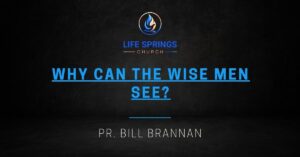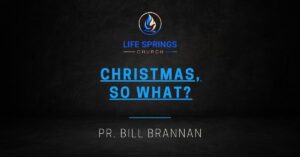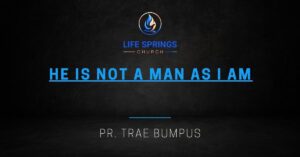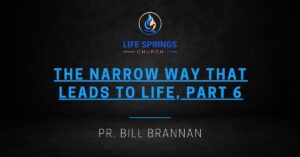Why Church Matters: Understanding Its Role in Human Flourishing

In today’s world, the question of why we attend church is more relevant than ever. Pastor Bill Brannan explores the profound connections between church participation and human flourishing, offering insights into the true purpose of church as a vehicle for personal and communal transformation.
Why Do We Go to Church
Understanding the purpose of attending church is crucial for every believer. Many might think of church as merely a weekly obligation, but its significance runs much deeper. Church serves as a gathering point for believers to worship, learn, and grow together in faith.
At its core, church is about community. It fosters relationships, accountability, and support among members. This collective experience allows individuals to share their struggles and triumphs, reinforcing the idea that we are not alone in our journeys.
Personal Growth and Maturity
Church provides an environment conducive to spiritual growth. Through sermons, teachings, and discussions, individuals can gain insights into their faith and how to apply it in their daily lives. The act of gathering together allows for shared learning, where questions can be asked, and wisdom can be exchanged.
Moreover, being part of a church community encourages accountability. When we share our lives with others, we invite them to speak into our situations. This accountability can lead to greater spiritual maturity and development.
The Value of Church
The value of church extends beyond personal benefits. It serves as a beacon of hope and a source of strength for the community. Churches often engage in outreach programs, providing assistance to those in need and advocating for justice in society.
This involvement showcases the church’s role in addressing social issues. By actively participating in the community, churches demonstrate that faith is not merely a private affair but has public implications.

Photo by William White on Unsplash
Building a Strong Foundation
When church members come together, they build a foundation of support and encouragement. This foundation is vital, especially during challenging times. Knowing that others are praying for you and walking alongside you can make a significant difference.
Furthermore, the church acts as a training ground for believers. It equips them with the knowledge and skills needed to navigate the complexities of life while holding onto their faith.
Jesus as Lord: First Priority
At the heart of the church is the acknowledgment of Jesus as Lord. This recognition shapes the church’s mission and purpose. When Jesus is placed at the center, everything else falls into place.
Worship becomes a response to His greatness, and service becomes an extension of His love. It is essential to prioritize our relationship with Jesus above all else, allowing Him to guide our actions and decisions within the church.

Photo by Sincerely Media on Unsplash
A Shift in Focus
Shifting the focus from ourselves to Jesus helps combat the self-centeredness that can creep into church culture. When the emphasis is on what we can give rather than what we can get, we cultivate a healthier church environment.
This shift encourages a culture of generosity and service, aligning our hearts with the mission of Christ. It becomes less about our preferences and more about fulfilling God’s purpose in the world.
Gospel Implications: Social, National, International
The implications of the Gospel are far-reaching. It influences not only individual lives but also societal structures. Historically, the Gospel has played a pivotal role in the abolition of slavery, the promotion of education, and the establishment of justice.
In societies where the Gospel is embraced, there tends to be a flourishing middle class and an emphasis on rule of law. This transformation is a testament to the power of the Gospel to bring about positive change in communities.

Photo by Joshua Onadipe on Unsplash
Justice and Mercy
God’s heart for justice and mercy is evident throughout Scripture. The Gospel compels us to advocate for those who cannot advocate for themselves. As the church, we are called to be a voice for the voiceless, ensuring that justice prevails in our communities.
Engaging in social issues is not just a duty but a reflection of our commitment to living out the Gospel. It is about embodying Christ’s love and compassion in tangible ways.
Generational Implications of the Gospel
The Gospel’s impact is not limited to the present; it has generational implications. Investing in future generations ensures that the truth of the Gospel continues to be passed down. This responsibility lies with the church to educate and mentor the younger generation.
By fostering a strong church community, we create an environment where faith can thrive and multiply. It is crucial to think about the legacy we leave behind and the values we instill in our children.

Photo by Alexis Brown on Unsplash
Building a Lasting Legacy
Engaging with younger members of the church helps bridge the generational gap. It creates opportunities for mentorship and leadership development. As older generations share their experiences, younger believers can learn valuable lessons and grow in their faith.
This generational connection contributes to a healthy church dynamic, where everyone feels valued and invested in the mission of the church.
Personal Blessings and Benefits of the Gospel
While the church serves a greater purpose, it also offers personal blessings. Being part of a church community provides emotional and spiritual support. It is a place where individuals can find encouragement during difficult times and celebrate during joyous occasions.
Additionally, the teachings of the Gospel offer guidance for daily living. They provide a framework for making decisions and navigating the challenges of life.

Photo by Elianna Gill on Unsplash
Experiencing Transformation
The personal transformation that comes from embracing the Gospel is profound. It shapes our identity and influences our relationships. As we grow in our understanding of Christ’s love, we are compelled to extend that love to others.
This transformation is not just for ourselves; it impacts those around us, creating a ripple effect of change within our communities.
The Destiny of the Church
The church has a destiny that is rooted in God’s purpose. It is called to be a light in a dark world, bringing hope and healing to those in need. The promise that the gates of hell will not prevail against the church is a powerful reminder of its resilience.
As we continue to fulfill our mission, we can be assured that God is with us, guiding and empowering us to make a difference. The church’s destiny is intertwined with the work of the Holy Spirit, who equips believers to carry out God’s plan on earth.

Photo by Edwin Andrade on Unsplash
Hope for the Future
In every generation, the church faces challenges, but it also holds the keys to hope and transformation. The message of the Gospel is timeless and relevant, capable of addressing the needs of every generation.
As we look to the future, we must remain steadfast in our commitment to the mission of the church. Together, we can navigate the complexities of today’s world while remaining anchored in the truth of the Gospel.
Church Storms the Gates of Hell
The church is not merely a gathering place; it is a powerful force designed to confront the darkness in the world. Jesus promised that the gates of hell would not prevail against the church, symbolizing that evil and oppression cannot withstand the advance of God’s kingdom. This imagery evokes a proactive stance, where the church is actively storming the gates rather than being a passive entity.

Photo by Egor Myznik on Unsplash
To storm the gates of hell, the church must embrace its identity as a community of Kings and Priests. Each member is called to take their place in this divine hierarchy, wielding the authority that comes from their relationship with Christ. This authority is not for personal gain but to liberate others, bringing hope and healing to a broken world.
The Call to Action
The church’s mission is clear: to be agents of change in society. This involves not only preaching the Gospel but also engaging in acts of justice, mercy, and love. The church must mobilize its members to serve their communities, advocate for the marginalized, and confront systemic injustices. Every action taken in love becomes a step toward dismantling the gates of hell.

Photo by Albert Stoynov on Unsplash
Leadership of a King
In understanding the leadership role within the church, we must look to the model of Christ as our King. His leadership style contrasts sharply with worldly authority. Jesus exemplified servant leadership, demonstrating that true power is found in humility and service to others.

Photo by Nick Fewings on Unsplash
The Nature of True Leadership
True leadership in the church is about empowerment, not control. Leaders are to inspire and equip others to fulfill their God-given potential. This means fostering an environment where individuals feel valued and encouraged to use their gifts for the benefit of the community.
As leaders, we must remember that we are all under the authority of the King. This understanding fosters accountability and humility, ensuring that leadership reflects the character of Christ. Leaders must also be willing to listen, learn, and adapt, recognizing that growth often comes from collaboration.
Structuring for Maturity
For the church to fulfill its mission, it must be structured in a way that promotes maturity among its members. This involves creating systems that allow individuals to grow in their faith and take on responsibilities within the community.

Photo by Akira Hojo on Unsplash
Creating Growth Pathways
Developing pathways for spiritual growth is essential. This can include small groups, mentorship programs, and educational opportunities that encourage deep engagement with Scripture and theology. The goal is to cultivate a culture of discipleship where believers are continually challenged to grow and mature in their faith.
Moreover, structuring for maturity means allowing individuals to take ownership of their faith journey. When people feel empowered to make decisions and take initiative, they are more likely to engage deeply with their church community and contribute meaningfully.
Kingdom of Kings and Priests
The concept of being a kingdom of Kings and Priests highlights the dignity and worth of every believer. Each person has a role to play in the kingdom, and this collective identity empowers the church to act with authority in the world.

Photo by Tim Foster on Unsplash
Equal Dignity in the Kingdom
In God’s kingdom, every believer is endowed with dignity and purpose. This understanding challenges societal hierarchies and calls for a community where all voices are heard and valued. The church must reflect this truth, creating a space where everyone can contribute and thrive.
As we embrace our identity as Kings and Priests, we recognize that our actions carry weight. We are called to represent God’s kingdom on earth, advocating for justice, mercy, and love in every sphere of life.
Education in the Church
Education plays a pivotal role in the church’s mission. It is essential for equipping believers to understand their faith deeply and engage with the world around them. A robust educational framework fosters critical thinking and encourages individuals to explore their beliefs.

Photo by Aaron Burden on Unsplash
Fostering a Learning Environment
The church should prioritize education that goes beyond mere knowledge transfer. It must cultivate a culture of inquiry, allowing members to ask questions and wrestle with difficult topics. This approach nurtures a deeper faith and a more profound understanding of God’s Word.
By engaging in thoughtful discussions and critical analysis, the church prepares its members to face the challenges of a complex world. Educated believers are better equipped to articulate their faith and defend it against opposing views.
Mission and Vision of the Church
The church’s mission and vision should reflect its commitment to restoring human flourishing through the Gospel. This mission calls for active participation in the lives of individuals and communities, seeking to bring about transformation in all areas of life.
Living Out the Mission
To live out this mission, the church must engage in outreach, service, and advocacy. This means stepping outside its walls and entering the community to address needs and promote justice. The church should be seen as a beacon of hope, demonstrating the love of Christ through tangible actions.
Moreover, the church’s vision should inspire its members to dream big and work together toward a common goal. By uniting under a shared mission, the church can effectively mobilize its resources and talents to make a lasting impact.
Growing Beyond Conformity
In a world that often pressures conformity, the church must encourage authenticity and individuality. Each believer brings unique gifts and perspectives, which should be celebrated rather than suppressed.

Photo by Vonecia Carswell on Unsplash
Embracing Diversity
The beauty of the church lies in its diversity. By embracing different backgrounds, experiences, and viewpoints, the church enriches itself and becomes more effective in its mission. This diversity should be reflected in leadership, ministry, and the overall culture of the church.
Encouraging individual expression within the framework of faith allows for a more robust and dynamic community. The church should be a place where everyone feels free to explore their faith and contribute to the body of Christ without fear of judgment.
In conclusion, the church matters because it embodies the hope of the Gospel and the promise of transformation. By storming the gates of hell, leading like Christ, structuring for maturity, and embracing diversity, the church can fulfill its mission of restoring human flourishing. Each believer plays a vital role in this journey, and together we can impact the world for Christ.
The Church and Human Flourishing
(Preaching Outline)
1) Why should we belong to and be involved in church?
a) Stephanie asked that question after watching a YouTube Video
b) I can’t tell you how important it is to ask that question, or the interesting ways that this connects to our vision and mission as a church.
c) More important probably than anything I am going to teach today would be owning that question for yourself and seeking answers to it.
d) Some answers I have an issue with:
i) You need to go to church to receive the blessing.
ii) Any answer that motivates through guilt or fear – that builds a culture that is contrary to the nature of the true church of Jesus Christ.
iii) Any answer that builds a shaky foundation that people can fall off of easily.
e) There are many people today who believe in Jesus but do not go to church.
i) Often they have been hurt or offended by church.
ii) Here is a challenging thought – could some people be closer to finding true church when they leave the church because there is something fundamentally wrong with the way we think about and go about church in general today?
f) When there is a problem, we need to take responsibility and own it, think deeply about it and discuss it.
g) I would suggest how we answer the question is very important and here are some initial thoughts.
i) If we make what people get out of church or the personal benefits of it the first priority, we are building on a shaky foundation.
ii) Suggested priority
(1) Jesus is Lord – He died, rose and ascended – God is to be worshipped in the way He prescribes.
(2) The social, national and international implications of the gospel.
(3) The Generational implications of the gospel.
(4) The personal blessings and benefits of the gospel.
h) We are going to explore some scriptures that will hopefully inspire us all to own the question asked as well as open discussions on how to genuinely build a church that restores human flourishing in the world.
2) The destiny of the church to bring liberty to the captives.
a) Matthew 16:13–18 (NKJV) — 13 When Jesus came into the region of Caesarea Philippi, He asked His disciples, saying, “Who do men say that I, the Son of Man, am?” 14 So they said, “Some say John the Baptist, some Elijah, and others Jeremiah or one of the prophets.” 15 He said to them, “But who do you say that I am?” 16 Simon Peter answered and said, “You are the Christ, the Son of the living God.” 17 Jesus answered and said to him, “Blessed are you, Simon Bar-Jonah, for flesh and blood has not revealed this to you, but My Father who is in heaven. 18 And I also say to you that you are Peter, and on this rock I will build My church, and the gates of Hades shall not prevail against it.
b) Revelation 5:7–10 (NKJV) — 7 Then He came and took the scroll out of the right hand of Him who sat on the throne. 8 Now when He had taken the scroll, the four living creatures and the twenty-four elders fell down before the Lamb, each having a harp, and golden bowls full of incense, which are the prayers of the saints. 9 And they sang a new song, saying: “You are worthy to take the scroll, And to open its seals; For You were slain, And have redeemed us to God by Your blood Out of every tribe and tongue and people and nation, 10 And have made us kings and priests to our God; And we shall reign on the earth.”
c) Revelation 5:11–12 (NKJV) — 11 Then I looked, and I heard the voice of many angels around the throne, the living creatures, and the elders; and the number of them was ten thousand times ten thousand, and thousands of thousands, 12 saying with a loud voice: “Worthy is the Lamb who was slain To receive power and riches and wisdom, And strength and honor and glory and blessing!”
d) Revelation 5:13–14 (NKJV) — 13 And every creature which is in heaven and on the earth and under the earth and such as are in the sea, and all that are in them, I heard saying: “Blessing and honor and glory and power Be to Him who sits on the throne, And to the Lamb, forever and ever!” 14 Then the four living creatures said, “Amen!” And the twenty-four elders fell down and worshiped Him who lives forever and ever.
3) The Leadership of the King.
a) * Builders of a new society need a leader who will not do the work for them but will inspire them to do it for themselves. The face of Moses, we saw earlier, was like the sun; that of Joshua like the moon (Bava Batra 75a). The difference is that sunlight is so strong it leaves no work for a candle to do, whereas a candle can illuminate when the only other source of light is the moon. Joshua empowered his generation more than a figure as strong as Moses would have done.[1]
b) (STRONG LEADERS CAN CREATE DEPENDENCE) – When people are led by “great men,” they can easily become passive, dependent, lacking in a sense of personal and collective responsibility. When there is a crisis, they expect the leader to deal with it. They do not expect him or her to challenge them to do it themselves. Moses’ greatness, never subsequently repeated, was both good news and bad. Without his strength the people would never have left Egypt, but dependent on his strength they would never develop the independence they needed to conquer the land.[2]
4) A Kingdom of Kings and Priests
a) * Judaism was the world’s first attempt to create a society of equal dignity under the sovereignty of God. It was the inspiration behind the statement in the American Declaration of Independence that “we hold these truths to be self-evident, that all men are created equal [and] that they are endowed by their Creator with certain unalienable rights.” Far from being self-evident, this statement would have been regarded as absurd by the ancient Greeks. Plato believed that that society was divided into three classes – rulers, soldiers, and the masses – who were as different as gold, silver, and brass.4 Aristotle believed that some people are born to be free, others to be slaves.[3]
b) * Judaism is about diffused responsibility, making each individual count, building a cohesive nation on the basis of a shared vision, educating people to their full potential, and valuing honest argument and the dignity of dissent. That is the kind of culture the rabbis inculcated during the centuries of dispersion.[4]
c) Aristotle – Islam vs. the West
5) The Book that Made Your World
a) * Above all, though, came the belief that status was conferred by scholarship, Torah study. On this, the rabbis’ remarks were forceful and unambiguous: With three crowns was Israel crowned…. The crown of priesthood was bestowed on Aaron and his descendants. The crown of kingship was conferred on David and his successors. But the crown of Torah is for all Israel. Whoever wishes, let him come and take it…. A Torah scholar of illegitimate birth takes precedence over an ignorant high priest.[5]
b) (GENERAL EDUCATION FOR ALL) – There is always a tendency for the most intelligent and scholarly to see themselves as more gifted than others and for the rich to attempt to purchase a better education for their children than the poor. Yet to an impressive – even remarkable – degree, Jews were vigilant in ensuring that no one was excluded from education and that schools and teachers were paid for by public funds. By many centuries, indeed millennia, Jews were the first to democratise education. The crown of Torah was indeed open to all.[6]
6) LSCC Mission & Vision
a) Vision: To restore human flourishing through the gospel of Jesus Christ.
b) Mission: Becoming a community that restores the world by reproducing the life of Christ with imperfect people growing in grace and serving through the gift of the Spirit.
c) Please ask the question, why church and add to it, what kind of church.
[1] Sacks, Jonathan. Numbers: The Wilderness Years (Covenant & Conversation Book 4) . The Toby Press. Kindle Edition.
[2] Sacks, Jonathan. Numbers: The Wilderness Years (Covenant & Conversation Book 4) . The Toby Press. Kindle Edition.
[3] Sacks, Jonathan. Numbers: The Wilderness Years (Covenant & Conversation Book 4) . The Toby Press. Kindle Edition.
[4] Sacks, Jonathan. Numbers: The Wilderness Years (Covenant & Conversation Book 4) . The Toby Press. Kindle Edition.
[5] Sacks, Jonathan. Numbers: The Wilderness Years (Covenant & Conversation Book 4) . The Toby Press. Kindle Edition.
[6] Sacks, Jonathan. Numbers: The Wilderness Years (Covenant & Conversation Book 4) . The Toby Press. Kindle Edition.









